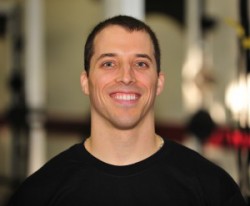Nutrition Week – Interview with Brian St. Pierre
February 20, 2012 by danny · 2 Comments
I’ve labeled this week nutrition week because I have 3 great nutrition posts that will be going up. Tomorrow and Wednesday a couple of my good friends (and they are trainers) will be sharing their foods logs with us. This should be great because it will give you a couple of examples of what a healthy day looks like (and ladies, they are both females). As you’ll see, there is definitely more than one way to skin a cat as their current nutrition plans are quite different. But first up, is an interview I did with nutrition expert Brian St. Pierre. Brian is one of my favorites “nutrition guys” for several reasons:
-He is very smart
-He stays on top of the most current research
-He makes difficult subject matter easy to follow for his readers
-He has worked with many clients in the real world which helps make him a better nutrition coach (in other words, he’s not just and “internet expert”)
With that said, let’s get to the interview…
Danny McLarty: A number of years ago, “nutrient timing” became THE thing. Many people would say: for us to reach our optimal physique, we need to appropriately time our carbohydrate consumption. Nowadays, it *seems* to me like many are now saying: at the end of the day, hitting our macro numbers is all that really matters. Where does your opinion fall in this discussion?
Brian St. Pierre: I would say that for the most part your total numbers are a far greater determinant of success than the timing of your macronutrients. In the hierarchy of importance timing is far below total intake for sure. Having said that though, there are instances where timing is important. For example an endurance athlete with multiple events in a 24 hour span would be one example. In addition this doesn’t mean that you shouldn’t employ any type of nutrient timing strategies, it just means that being neurotic about eating immediately before or after you finish training is unnecessary. It is ok to wait an hour or two as it really won’t make a bit of difference. If you eat 1-3 hours before training and within 1-2 hours after training, essentially placing your training between two normal meals, then you will be just fine. While some acute data may support nutrient timing, the longer-term research just has not bore this out. If you feel your results are better when you eat closer to your training, go for it, it certainly won’t hurt. It is all about your results, so do what works for you, but in general I just find that keeping it simple brings the greatest long-term bang for your buck.
DM: There are some people out there that don’t handle dairy well. When these individuals reduce their dairy intake they start to feel better. However, many (particularly females and kids) of them are nervous that the reduction of calcium consumption will lead to bone fractures and other problems. Can you tell us why this (reduction of calcium consumption) should not be a concern? Or should it?
BSP: Well that is certainly a difficult question to answer. Calcium consumption in the US is quite high, but do keep in mind that vitamin D levels in the US are quite low on average. Vitamin D’s main job is calcium absorption (among many others), so even if our calcium intake is high, if our vitamin D levels are inadequate it may not be helping. In addition there are many other elements needed for proper bone health beyond calcium and vitamin D – magnesium, vitamin K, phosphorus, etc. Beyond that you can get into the need simply for adequate calories and resistance training, but that is beyond the scope of this question.
The point is that just focusing on calcium intake is missing the forest for the trees. Even if you don’t consume dairy, you can certainly get in adequate calcium from non-dairy milks, leafy greens, almonds, etc. In addition ensuring adequate vitamin D levels will aid in absorbing the calcium you do consume, and it would also be wise to ensure adequate magnesium and vitamin K intake as well. Add in a quality resistance training program and consumption of maintenance calories and bone fractures should be of little concern.
(Danny’s Note: To get more great thoughts from Brian on dairy, check out this 3-part series he did …)
Is Dairy Healthy? The Whole Story – Part I
Is Dairy Healthy? The Whole Story – Part 2
Is Dairy Healthy? The Whole Story – Part 3
DM: Some coaches/trainers/nutritionists have different opinions on how to incorporate cheat meals. Some recommend to have a day that they just let loose. Others prefer to have their clients pick ONE cheat meal here and there throughout the course of the week. What approach do you feel works best?
BSP: I personally don’t like cheat days, because people tend to get too wrapped up thinking about those days and all the foods they have been avoiding like a good little boy or girl. To me it warps perception of food. I prefer people work in those “cheat” foods or comfort foods here and there as part of their normal intake. As long as you are keeping your calorie and macronutrient totals in check, having up to 10% of your intake from those foods is a non-issue.
In my mind it is all about creating health eating habits and patterns, and entire cheat days simply do not do that. People like to talk about resetting leptin and other hormones after dieting hard as a reason for a cheat day. I am not a fan of hardcore dieting followed by high-calorie cheat days, even if it works, because it is certainly not setting a long-term eating pattern that someone can follow for life. It is a temporary fix, like painting over a water stain in your ceiling without fixing the roof. In the long run it just isn’t going to work.
DM: Quite often when people simply start to “clean up” their eating, total calorie amount falls into place. But for those that handle numbers better, do you have general recommendations as a starting point? (i.e. X amount of calories x BW for those looking to lose fat; X amount of cals x BW for those looking to gain LBM, etc).
BSP: I definitely agree with your first statement, and it is one of the main reasons why my main focus with people is to get them to eat mostly real, whole minimally processed food, as it tends to take care of a lot of other issues indirectly. However for those are numbers inclined or who are trying to get lean for a particular event where you have to be a little more aggressive then I do have a general recommendation that I mostly stole from Alan Aragon. I say mostly because I add a little twist. It is also important to remember that this is just a starting point estimate, some people still need more or less calories than this to meet their goals, but this does fit a good majority of the population.
My recommendation is as follows. Figure out how many hours you spend training per week. Then decide if you train at a low, medium or high intensity. Ok good. Here we go:
Females: Goal Bodyweight X (8-10 + the number of hours training per week). You choose 8 if your training intensity is low, 9 if medium, and 10 if high.
Males: Goal Bodyweight X (9-11 + the number of hours training per week). You choose 9 if your training intensity is low, 10 if medium, and 11 if high.
This is a good starting point, though there are some caveats. For every decade over your twenties I tend to take 100 calories off the final number. Try this starting point for a few weeks and see what happens. Don’t like the results, then either add or decrease 200-250kcals per day and see what happens.
I will give a few real life examples. Let’s take a 25 year old male who is training hard to gain some mass and a 52 year old woman training moderately hard to lose some weight. The guy’s target bodyweight is 200lbs and the woman’s is 150lbs. They both exercise 5 hours per week.
Woman: 150 X (9+5)= 2100 – 300 (for age) = 1800kcal total per day.
Man: 200 X (11+5) = 3200 total kcal per day.
There are far more complicated formulas, but I don’t find that they are any more accurate than this.
Hope that helps and thanks for having me!
DM: Thanks, Brian! As usual, great stuff! To get more outstanding information from Brian, be sure to check out his website over at brianstpierretraining.com.
If you have any questions or comments, be sure to leave them in the comments section below.
Connect on twitter @DannyMcLarty












